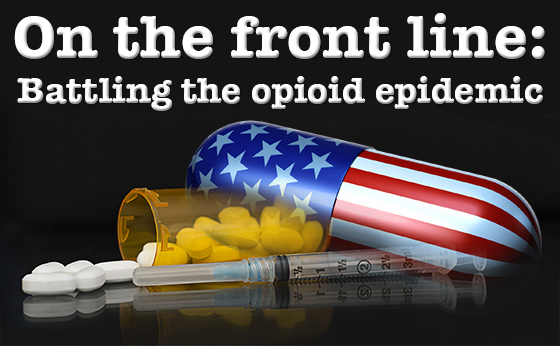|
May 2018
Battling the opioid epidemic: A roundup of news and information
We hope this information is useful as you continue your efforts to combat the opioid epidemic.
Resources help providers communicate about risks, benefits of opioid therapy
 The Centers for Disease Control and Prevention offers resources to support its CDC Guideline for Prescribing Opioids for Chronic Pain. The resources were designed to improve communication between providers and patients about the risks and benefits of opioid therapy for chronic pain, improve the safety and effectiveness of pain treatment and reduce the risks associated with long-term opioid therapy, including opioid use disorder, overdose and death. You can access them by clicking here. The Centers for Disease Control and Prevention offers resources to support its CDC Guideline for Prescribing Opioids for Chronic Pain. The resources were designed to improve communication between providers and patients about the risks and benefits of opioid therapy for chronic pain, improve the safety and effectiveness of pain treatment and reduce the risks associated with long-term opioid therapy, including opioid use disorder, overdose and death. You can access them by clicking here.
Reminder: MQIC guideline for opioid use in adults
Here’s a recap of key recommendations from the Michigan Quality Improvement Consortium’s guideline called Opioid Use in Adults Excluding Palliative and End-of-Life Care:
- Treat pain with non-drug therapy and non-opioid medications when possible.
- Screen for risk of dependence.
- Obtain a Prescription Drug Monitoring Program report.
- Perform urine drug testing when warranted.
- Discuss risks of dependency, overdose and death.
- Prescribe the lowest effective dose — three days or fewer for acute pain.
- Discuss realistic goals for pain and function, including discontinuing therapy if benefits don’t outweigh the risks; re-evaluate pain and function throughout the treatment period.
- Avoid prescribing opioids with benzodiazepines, muscle relaxants or hypnotics.
- Consider offering the patient or family member naloxone when there are risk factors for overdose. (Following naloxone use, the patient should be seen immediately in a hospital emergency department.)
- When considering increasing dosage to > 90 MME/day, reassess evidence of individual benefits and risks.
- Avoid renewal without clinical reassessment.
The MQIC guideline was based on the CDC Guideline for Prescribing Opioids for Chronic Pain. To read the MQIC guideline, click here
Mi-CCSI to offer basic and advanced pain management training
The Michigan Center for Clinical Systems Improvement, or Mi-CCSI, in collaboration with its members and community organizations, has developed a comprehensive training program to address patients with acute and chronic pain. The curriculum includes the foundations of pain management, which addresses:
- Basics of pain management mechanisms
- Pathophysiology
- Biopsychosocial aspects of pain
- Pharmacotherapy
- Non-pharmacy treatment approaches
The advanced practical workshops include:
- Approaches for medication tapering
- Conducting difficult conversations with patients
- Comprehensive assessment of biopsychosocial aspects of pain
- Basics of addiction
- Referral and communications strategies with specialty providers
- Using the new automated prescription system
The intended audience includes primary care practice teams or individual providers and clinical and nonclinical staff, including care managers, social workers, medical assistants, office managers and staff, pharmacists and behavioral health specialists.
The dates, locations and registration link are in the table below.
Date |
Location |
Registration website |
June 21 |
Traverse City
Park Place Hotel |
miccsi.org/training/pain-management-training |
Oct. 12 |
Grand Rapids
Masonic Center |
Oct. 13 |
Muskegon
Holiday Inn-Harbor |
Oct. 30 |
Wixom/New Hudson
Blue Cross Lyon Meadows Conference Center |
Nov. 20 |
Wixom/New Hudson
Blue Cross Lyon Meadows Conference Center |
For more information about efforts to address the opioid epidemic, see the articles on appropriate drug disposal and the Michigan Automated Prescription System, also in this issue.
None of the information included in this article is intended to be legal advice.
| 
